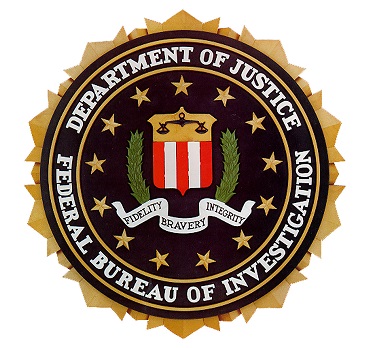F.B.I.: Difference between revisions
No edit summary |
No edit summary |
||
| (11 intermediate revisions by 2 users not shown) | |||
| Line 1: | Line 1: | ||
;[[Mortals and Others]] | ;[[Mortals and Others]] | ||
[[File:Fbi-logo-large.jpg]] | |||
<br> | |||
<br> | |||
== Introduction == | |||
The Federal Bureau of Investigation (FBI) is a governmental agency belonging to the United States Department of Justice that serves as both a federal criminal investigative organization and an internal intelligence agency. The FBI is the lead U.S. counter-terrorism agency and the lead U.S. counterintelligence agency. It is the USA's security service, and is a component agency of the U.S. Intelligence Community. Also, it is the government agency responsible for investigating crimes on sovereign Native American reservations in the United States under the Major Crimes Act. The FBI has investigative jurisdiction over violations of more than 200 categories of federal crime. | |||
The bureau was established in 1908 as the Bureau of Investigation (BOI). Its name was changed to the Federal Bureau of Investigation (FBI) in 1935. The FBI headquarters is the J. Edgar Hoover Building, located in Washington, D.C. The bureau has fifty-six field offices located in major cities throughout the United States, and more than 400 resident agencies in lesser cities and areas across the nation. More than 50 international offices called "legal attachés" exist in U.S. embassies and consulates general worldwide. | |||
=== | == History == | ||
=== Background === | |||
In 1896, the National Bureau of Criminal Identification was founded, which provided agencies across the country with information to identify known criminals. The 1901 assassination of President McKinley created an urgent perception that America was under threat from anarchists. The Department of Justice and the Department of Labor had been keeping records on anarchists for years, but President Theodore Roosevelt wanted more power to monitor them. | |||
The Justice Department had been tasked with regulating interstate commerce since 1887, though it lacked the staff to do so. It had made little effort to relieve its staff shortage until the Oregon land fraud scandal erupted around the start of the 20th century. President Roosevelt instructed Attorney General Charles Bonaparte to create an autonomous investigative service that would report only to the Attorney General. | |||
Bonaparte reached out to other agencies, including the Secret Service, for personnel, investigators in particular. On May 27, 1908, Congress forbade this use of Treasury employees by the Justice Department, citing fears that the new agency would serve as a secret police. Again at Roosevelt's urging, Bonaparte moved to organize a formal bureau of investigation with its own staff of special agents. | |||
* -- [[FBI - Chicago Field Office]] | |||
* -- [[FBI - New York Field Office]] | |||
* -- | * -- [[FBI - St. Louis Field Office]] | ||
* -- | * -- [[FBI - Special Affairs Division]] | ||
* -- | ---- | ||
* -- | http://en.wikipedia.org/wiki/Federal_Bureau_of_Investigation | ||
Latest revision as of 17:37, 15 February 2015
Introduction
The Federal Bureau of Investigation (FBI) is a governmental agency belonging to the United States Department of Justice that serves as both a federal criminal investigative organization and an internal intelligence agency. The FBI is the lead U.S. counter-terrorism agency and the lead U.S. counterintelligence agency. It is the USA's security service, and is a component agency of the U.S. Intelligence Community. Also, it is the government agency responsible for investigating crimes on sovereign Native American reservations in the United States under the Major Crimes Act. The FBI has investigative jurisdiction over violations of more than 200 categories of federal crime.
The bureau was established in 1908 as the Bureau of Investigation (BOI). Its name was changed to the Federal Bureau of Investigation (FBI) in 1935. The FBI headquarters is the J. Edgar Hoover Building, located in Washington, D.C. The bureau has fifty-six field offices located in major cities throughout the United States, and more than 400 resident agencies in lesser cities and areas across the nation. More than 50 international offices called "legal attachés" exist in U.S. embassies and consulates general worldwide.
History
Background
In 1896, the National Bureau of Criminal Identification was founded, which provided agencies across the country with information to identify known criminals. The 1901 assassination of President McKinley created an urgent perception that America was under threat from anarchists. The Department of Justice and the Department of Labor had been keeping records on anarchists for years, but President Theodore Roosevelt wanted more power to monitor them.
The Justice Department had been tasked with regulating interstate commerce since 1887, though it lacked the staff to do so. It had made little effort to relieve its staff shortage until the Oregon land fraud scandal erupted around the start of the 20th century. President Roosevelt instructed Attorney General Charles Bonaparte to create an autonomous investigative service that would report only to the Attorney General.
Bonaparte reached out to other agencies, including the Secret Service, for personnel, investigators in particular. On May 27, 1908, Congress forbade this use of Treasury employees by the Justice Department, citing fears that the new agency would serve as a secret police. Again at Roosevelt's urging, Bonaparte moved to organize a formal bureau of investigation with its own staff of special agents.
- -- FBI - Chicago Field Office
- -- FBI - New York Field Office
- -- FBI - St. Louis Field Office
- -- FBI - Special Affairs Division
http://en.wikipedia.org/wiki/Federal_Bureau_of_Investigation
